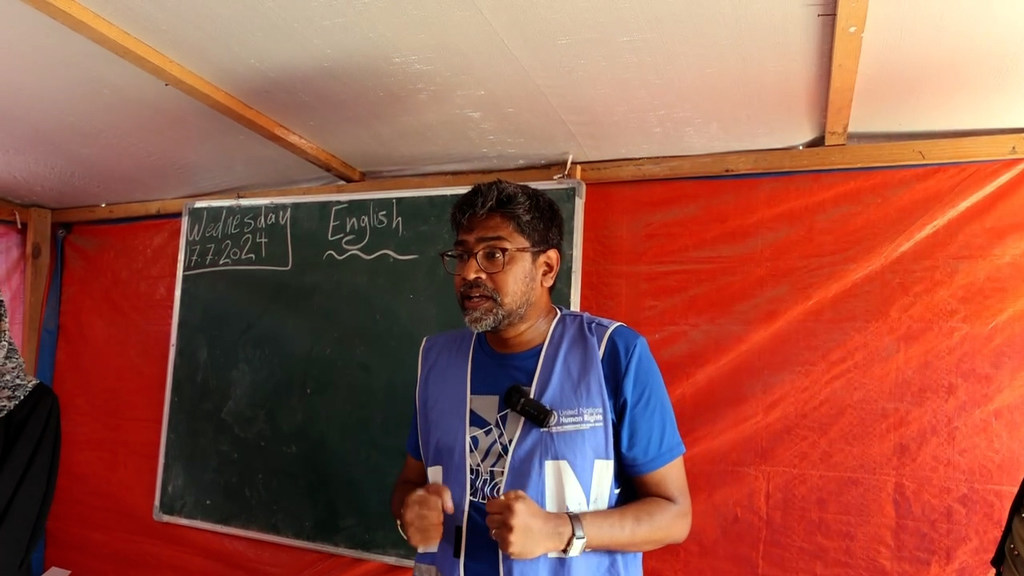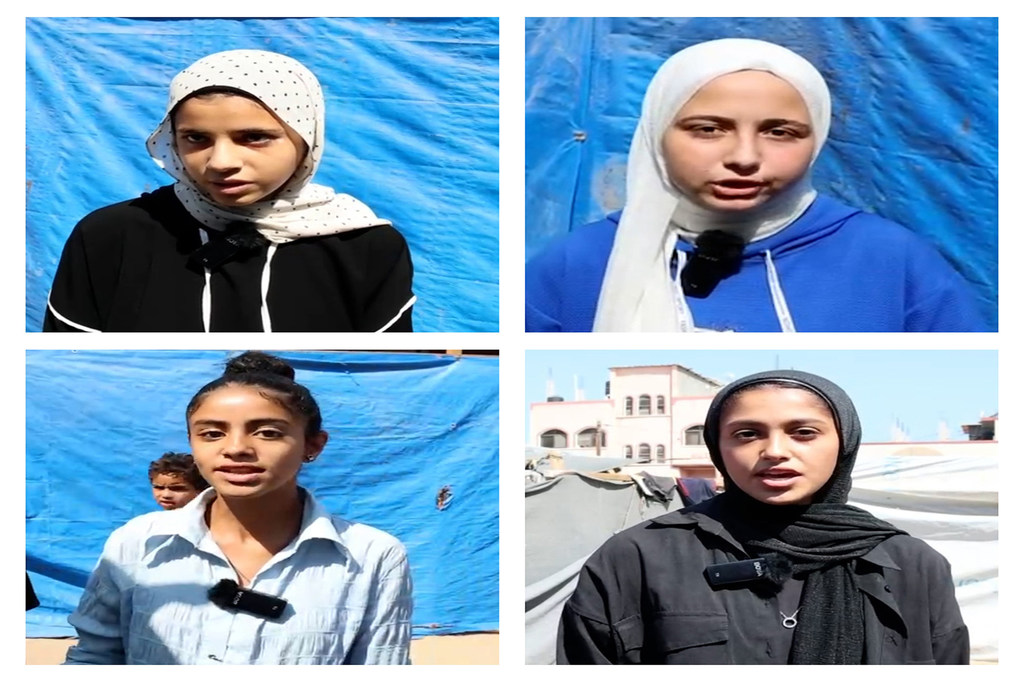In a lively interactive dialogue, OHCHR’s Ajith Sunghay had invited the young students to discuss what human rights means to them. In turn, they shared their pain and hopes, sending messages to the world demanding an end to the war so that they could return to their homes safely.
“We want to show solidarity with them, support them, work with them and see how we can strengthen our relationship,” he told UN News. “We have known them for many years. We have created this bond and connection.”
The ensuing lively discussion saw Mr. Sunghay answer a volley of questions interspersed with facts on the displaced students’ rights under international humanitarian law, the importance of defending these rights and the role of the UN and its agencies in the Gaza Strip and their duties towards the Palestinians in light of the dire circumstances they face daily.
‘Everyone has a right’
At the outset, Mr. Sunghay asked the students how well they understood human rights. The answers echoed across the tent.
“Everyone has a right,” one student said.
“My right to go to school or university,” another stated, referring to the right to education.
Still another indicated “the right to live in a safe place,” meaning the right to life.
Providing an overview of the basics of human rights, Mr. Sunghay explained that people from different countries came together and drafted and agreed upon the Universal Declaration of Human Rights in 1948, which forms the basis for all other human rights agreements.
‘Why are you in Gaza?’
Among questions raised by the youthful group, one was a frank inquiry.
“Why are you here in Gaza?” a student asked the UN official.
To that, Mr. Sunghay explained the two main objectives for his visit to the enclave.
“First and foremost, I came to see how we can increase the protection of people,” he said. “It is not easy. As the Office of the High Commissioner for Human Rights (OHCHR), we lead the protection cluster with other UN organizations such as the UN Office for the Coordination of Humanitarian Affairs (OCHA) and the UN Children’s Fund (UNICEF). We are all trying to see how we can protect civilians. And that includes all of you as well.”
He said the second reason is human rights.
“This is not easy,” he continued. “But, I am also here to see and assess the human rights situation and more importantly, to meet people and understand the challenges and difficulties they face and the human rights violations that are taking place in Gaza and to engage with civil society, which is the backbone of our response.”
UN News/Ziad Taleb
Students in Deir Al-Balah, in central Gaza, participate in an interactive dialogue on human rights under international law.
‘Do we have the same rights?’
Another girl asked whether children in Gaza had the same rights as children in other parts of the world.
“Of course, you have rights in these agreements on paper and then comes the implementation,” the UN official replied. “You’re right, there are a lot of contradictions around the world.

UN News/Ziad Taleb
OHCHR’s Ajith Sunghay talks about human rights under international humanitarian law.
“But, we want to achieve equality around the world in how rights are respected, and that’s never easy. That’s why we have to keep pushing. We want to see you in classrooms that are right for you, just like other children in other parts of the world have decent classrooms.”
There is a long way to go to achieve this kind of equal respect for human rights, he continued.
“But, we cannot give up and that is why we continue to fight with civil society, governments and UN institutions. It is a joint effort. Yes, we are all equal and should be treated as such. Yes, there are implementation problems, and we need governments to work with us. That is also very important.”
As the dialogue continued, another girl asked about the right to return to her home.
He said they have the right to live in a safe place, the right to housing, the right to shelter, the right to life.
“We have a long way to go to achieve all rights, and we cannot give up on that,” he continued. “We monitor and see where the rights are not yet respected and then we inform the international community. We are trying to influence decision makers so that you have the same rights as everyone else.”

UN News/Ziad Taleb
“We want our full rights”: Gazan students send strong messages to the world.
‘We want our full rights’
When asked what the students’ messages to the world are, they readily told UN News, in Arabic and English.
“Before the war, I lived in the Nuseirat camp,” said Lama Abu al-Saeed, a displaced person from central Gaza. “Now, I am in Istiqlal camp in Deir Al-Balah. I have a bad feeling in this camp. This is not my life. This is not the life of Gaza…Now, I hope this war will stop so I can go back to my home.”
Where is freedom for us, the children who live in fear of the occupation?
– Tala Al-Khatib
Tala Al-Khatib, a 13-year-old displaced from Jabalia camp in northern Gaza Strip, said she wanted to convey her message “to all the bad people who wanted to occupy our city, Gaza”.
“They killed thousands of children and orphaned thousands more,” she said. “They killed men and made women widows. Where is our right to live in peace and security? Where is freedom for us, the children who live in fear of the occupation? We want our full rights.”
Sama Al-Borno, a displaced girl from the Al Zeitoun neighbourhood in Gaza City, expressed her hope that the shooting would stop so that she could return to her home.
Dima Abu Saeed, from Al Bureij camp in central Gaza summed up a common refrain.
“I was displaced many times until I arrived at our current camp, Al Istiqlal camp,” she said. “I suffered a lot as a result of my displacement until I arrived at this camp, which shelters us and a number of displaced people. I hope very much that this war will end.”




